ETNA KCS6178NF User Manual
Displayed below is the user manual for KCS6178NF by ETNA which is a product in the Fridge-Freezers category. This manual has pages.
Related Manuals

GEBRUIKSAANWIJZING
INSTRUCTIONS FOR USE
KOELKAST MET VRIEZER
REFRIGERATOR WITH FREEZER
KCS6178NF

NL 2
INHOUDSOPGAVE
Uw koelkast met vriezer
Inleiding 4
Link naar de EPREL-database van de EU 4
Veiligheidsvoorschriften 5
Installeren en aansluiten
De keuze van de ruimte 11
Toestel aansluiten 12
Draairichting deur wijzigen / toestel inbouwen in een kast 13
Voor het eerste gebruik
Voordat u het toestel de eerste keer gebruikt 14
Advies om energie te besparen 14
Toestelbeschrijving
Toestel 15
Bediening van het toestel
Instellen van de thermostaat 16
Snel invriezen 16
Voedsel bewaren en invriezen
Aanbevolen indeling 17
Voorkom het bederven van voedsel 18
Vers voedsel bewaren in de koelkast 18
Invriezen en bewaren van voedsel in de vriezer 19
Bevroren voedsel ontdooien 20

NL 3
INHOUDSOPGAVE
Gebruikte pictogrammen
Belangrijk om te weten
Tip
Waarschuwing; Brandgevaar / ontvlambare materialen
Onderhoud
Het toestel ontdooien 21
Het toestel reinigen 22
Storingen
Storingstabel 23
Milieuaspecten
Verpakking en toestel afdanken 25

NL 4
Inleiding
Gefeliciteerd met uw keuze voor deze koelkast van Etna. In het ontwerp van dit product heeft
eenvoudige bediening en optimale gebruiksvriendelijkheid centraal gestaan.
In deze handleiding leest u hoe u dit toestel het best kunt gebruiken. Naast informatie over de
bediening, vindt u hier ook achtergrondinformatie die u tijdens het gebruik van het toestel van
pas kan komen.
Lees eerst de veiligheidsvoorschriften voordat u het toestel
gebruikt!
Lees deze handleiding door voordat u het toestel in gebruik neemt, en berg de handleiding
daarna veilig op voor toekomstig gebruik.
Een deel van de installatie-instructies worden afzonderlijk meegeleverd.
Link naar de EPREL-database van de EU
De QR-code op het energielabel dat bij het apparaat wordt geleverd, biedt een weblink naar de
registratie van dit apparaat in de EPREL-database van de EU. Bewaar het energielabel samen
met de gebruikershandleiding en alle andere documenten die bij dit apparaat zijn geleverd ter
referentie.
Het is mogelijk om informatie over de prestaties van het product te vinden in de EU EPREL-
database met behulp van de link https://eprel.ec.europa.eu en de modelnaam en het
productnummer op het typeplaatje van het apparaat.
Kijk voor meer informatie over het energielabel op www.theenergylabel.eu.
UW KOELKAST MET VRIEZER

NL 5
Lees zorgvuldig de meegeleverde instructies voor installatie en
gebruik van het apparaat. De fabrikant is niet verantwoordelijk
voor letsel en schade veroorzaakt door een foutieve installatie.
Bewaar de instructies van het apparaat voor toekomstig gebruik.
Veiligheid van kinderen en kwetsbare mensen
• Het apparaat is niet bedoeld voor gebruik door personen
(waaronder kinderen) met een lichamelijke, zintuiglijke of
verstandelijke beperking of personen met te weinig kennis
en ervaring, tenzij iemand die verantwoordelijk is voor hun
veiligheid toezicht houdt of hun instructies heeft gegeven over
het gebruik van het apparaat.
• Houd toezicht op kinderen om ervoor te zorgen dat ze niet met
het apparaat spelen.
• Reiniging en onderhoud mogen niet door kinderen worden
uitgevoerd zonder toezicht.
• Houd alle verpakkingsmaterialen uit de buurt van kinderen.
Alleen voor Europese markten
• Dit apparaat kan worden gebruikt door kinderen van 8
jaar en ouder, mensen met een lichamelijke, zintuiglijke of
verstandelijke beperking of mensen die weinig ervaring met
en kennis van het apparaat hebben, mits zij onder toezicht
staan of zijn geïnstrueerd hoe zij het apparaat veilig moeten
gebruiken en zij de mogelijke gevaren begrijpen.
• Laat kinderen niet met het apparaat spelen.
• Reiniging en onderhoud mogen niet door kinderen worden
uitgevoerd als er geen toezicht is.
• Kinderen van 3 tot 8 jaar mogen producten in toestellen met
een koelfunctie leggen en ook eruit halen.
VEILIGHEIDSVOORSCHRIFTEN
Vertaling van originele instructie

NL 6
Algemene veiligheid
• De lamp in dit huishoudelijke apparaat is uitsluitend bedoeld
voor verlichting van dit apparaat. De lamp is niet geschikt voor
de verlichting van een huishoudelijke ruimte.
• WAARSCHUWING! Dit apparaat is bestemd voor
huishoudelijk of daarmee vergelijkbaar gebruik, zoals:
– in personeelskeukens in winkels, kantoren en andere
werkomgevingen;
– voor gasten in gastboerderijen, hotels, motels en andere
overnachtings gelegenheden;
– in bed & breakfast-achtige omgevingen;
– voor catering en vergelijkbare niet-zakelijke doeleinden.
• WAARSCHUWING! Houd de ventilatieopeningen altijd vrij van
obstructies; dit geldt zowel voor vrijstaande als ingebouwde
modellen.
• WAARSCHUWING! Gebruik geen mechanische of andere
middelen om het ontdooiproces te versnellen, behalve die
middelen die door de fabrikant zijn aanbevolen.
• WAARSCHUWING! Let op dat u het koelcircuit niet
beschadigt.
• WAARSCHUWING! Gebruik geen elektrische apparaten in de
koelkast, tenzij deze door de fabrikant worden aanbevolen.
• WAARSCHUWING! Gebruik geen waterstralen of stoom om
het apparaat te reinigen.
• WAARSCHUWING! Maak het apparaat schoon met
een vochtige, zachte doek. Gebruik alleen neutrale
schoonmaakmiddelen. Gebruik geen schuurmiddelen,
schuursponsjes, oplosmiddelen of metalen voorwerpen.
• WAARSCHUWING! Bewaar geen explosieve substanties zoals
spuitbussen met drijfgas in dit apparaat.
• WAARSCHUWING! Als het netsnoer beschadigd is, moet het
vervangen worden door de fabrikant, een servicemedewerker
of personen met vergelijkbare kwalificaties om gevaarlijke
situaties te voorkomen.
VEILIGHEIDSVOORSCHRIFTEN

NL 7
Installatie
• WAARSCHUWING! Dit apparaat mag uitsluitend door een
erkende monteur worden geïnstalleerd.
• Verwijder alle verpakkingsmaterialen.
• Controleer het apparaat op transportschade. Sluit het apparaat
niet aan als het beschadigd is.
• Volg altijd de installatie-instructies in de bijgeleverde
installatiehandleiding.
• Wees voorzichtig met het verplaatsen van het apparaat, het is
zwaar. Draag altijd veiligheidshandschoenen.
• Zorg ervoor dat rond het apparaat lucht kan circuleren.
• Wacht ten minste 4 uur alvorens het apparaat aan de
netstroom aan te sluiten. Hierdoor kan de olie terug in de
compressor stromen.
• Installeer het apparaat niet in de nabijheid van radiators,
fornuizen, ovens of kookplaten.
• De achterzijde van het apparaat moet tegen de muur worden
geplaatst.
• Installeer het apparaat niet op een plaats met direct zonlicht.
• Gebruik dit apparaat niet in gebieden die te vochtig of te koud
zijn, zoals bijgebouwen, garages of kelders.
• Til de voorkant van het apparaat op als u hem wilt verplaatsen,
om krassen op de vloer te voorkomen.
• WAARSCHUWING! Zorg er bij het plaatsen van het apparaat
voor dat het netsnoer niet bekneld of beschadigd raakt.
VEILIGHEIDSVOORSCHRIFTEN

NL 8
Elektrische aansluiting
• WAARSCHUWING! Gevaar voor brand en elektrische schokken.
• Dit apparaat moet worden aangesloten op een geaard
stopcontact.
• Alle elektrische aansluitingen moeten door een gediplomeerd
elektromonteur worden gemaakt.
• Controleer of de elektrische informatie op het typeplaatje
overeenkomt met de stroomvoorziening. Zo niet, neem dan
contact op met een elektromonteur.
• Gebruik altijd een correct geïnstalleerd, schokbestendig
stopcontact.
• Gebruik niet meerdere stekkers of verlengsnoeren.
• Zorg dat u de elektrische onderdelen (hoofdstekker, kabel,
compressor) niet beschadigt. Neem contact met de
Servicedienst of een elektrotechnicus om de elektrische
onderdelen te wijzigen.
• De stroomkabel moet lager blijven dan het niveau van de
stopcontact.
• Steek de stekker pas in het stopcontact als de installatie is
voltooid. Zorg ervoor dat het netsnoer na installatie bereikbaar is.
• Pak altijd de stekker vast als u de kabel uit het stopcontact wilt
halen. Trek nooit aan de voedingskabel.
• WAARSCHUWING! Plaats geen meervoudige stekkerdozen of
draagbare voedingen aan de achterkant van het apparaat.
• Als een vast apparaat niet is voorzien van een netsnoer en
een stekker, of van een andere manier om de verbinding met
het elektriciteitsnet te verbreken, waarbij sprake is van een
contactverbreker in alle polen die volledige verbreking biedt in
de situaties die onder overspanningscategorie III vallen, moet er
in de vaste elektriciteitskabel een verbreker worden aangebracht
volgens de geldende richtlijnen. Bij gebruik van een omnipolaire
schakelaar met een contactafstand van ten minste 3 mm in het
netsnoer wordt aan deze eis voldaan.
VEILIGHEIDSVOORSCHRIFTEN

NL 9
Gebruik
• WAARSCHUWING! Gevaar voor letsel, brandwonden,
elektrische schokken of brand.
• De specificatie van het apparaat mag niet worden veranderd.
• Plaats geen elektrische apparaten (bijv. ijsmachines) in het
apparaat tenzij uitdrukkelijk geschikt verklaard door de
fabrikant.
• Zorg ervoor dat u het koelcircuit niet beschadigt. Het bevat
isobutaan (R600a), aardgas met een hoge ecologische
compatibiliteit. Dit gas is ontvlambaar.
• Als er schade aan het koelcircuit optreedt, zorg er dan voor
dat er zich geen vlammen en andere ontstekingsbronnen in de
kamer bevinden. Ventileer de kamer goed.
• Zet geen hete items op de kunststofonderdelen van het
apparaat.
• Bewaar geen ontvlambare gassen en vloeistoffen in het
apparaat.
• Plaats geen ontvlambare producten of items die vochtig zijn
door ontvlambare producten in, bij of op het apparaat.
• Raak de compressor of condensator niet aan. Ze zijn heet.
Onderhoud en reiniging
• WAARSCHUWING! Gevaar voor letsel of schade aan het
apparaat.
• Schakel het apparaat uit en trek de stekker uit het stopcontact
voordat u onderhoudshandelingen verricht.
• Het koelcircuit van dit apparaat bevat koolwaterstoffen. Enkel
bevoegde personen mogen de eenheid onderhouden en
herladen.
• Controleer regelmatig de afvoer van het apparaat en reinig het
indien nodig. Indien de afvoer verstopt is, zal er water op de
bodem van het apparaat liggen.
VEILIGHEIDSVOORSCHRIFTEN

NL 10
Verwijdering
• WAARSCHUWING! Gevaar voor letsel of verstikking.
• Haal de stekker uit het stopcontact.
• Snij het netsnoer van het apparaat af en gooi dit weg.
• Verwijder de deur om te voorkomen dat kinderen en huisdieren
opgesloten raken in het apparaat.
• Het koelcircuit en de isolatiematerialen van dit apparaat zijn
ozonvriendelijk.
• Het isolatieschuim bevat ontvlambare gassen. Neem contact
met uw plaatselijke overheid voor informatie m.b.t. correcte
afvalverwerking van het apparaat.
• Veroorzaak geen schade aan het deel van de koeleenheid dat
zich naast de warmtewisselaar bevindt.
VEILIGHEIDSVOORSCHRIFTEN

NL 11
INSTALLEREN EN AANSLUITEN
De keuze van de ruimte
• Plaats het toestel niet in de buurt van warmtebronnen, bijvoorbeeld een gasfornuis,
verwarming, boiler enz. en stel het niet bloot aan directe zonnestraling.
• Plaats het toestel in een droge en regelmatig geventileerde ruimte. De toegestane
temperatuur van de omgeving voor de juiste werking van het toestel is afhankelijk van de
uitvoering (klasse) van het toestel, die op het typeplaatje van het toestel vermeld is.
Beschrijving Klasse Omgevingstemperatuur °C Relatieve vochtigheid
Uitgebreid gematigd SN +10 tot +32
≤ 75%
Gematigd N +16 tot +32
Subtropisch ST +16 tot +38
Tropisch T +16 tot +43
Plaats het toestel niet in een ruimte waar de temperatuur kan dalen tot onder de laagst
toegestane omgevingstemperatuur, want dit kan een onjuiste werking veroorzaken!
Plaats het toestel niet in een ruimte waar de temperatuur kan dalen tot onder 5 °C, want
dit kan een storing veroorzaken!
Het toestel is niet geschikt voor buitengebruik en het mag niet bloot worden gesteld aan
regen.
• Het toestel moet tenminste 5 cm van het elektrisch of gasfornuis respectievelijk 30 cm
van de verwarming of kachel worden geïnstalleerd. Bij kleinere afstanden moet er een
isolatieplaat worden gebruikt.
• De afstand tot de muur, achter en aan de zijkanten van de kast, moet ongeveer 5 cm
te bedragen. Een keukenkastje boven de koelkast moet aan de achterzijde een ruimte
van tenminste 5 cm hebben. Daardoor wordt een voldoende koeling van de condensor
gewaarborgd.
• Na installatie moet de stekker toegankelijk zijn!
Plaats het toestel in een ruimte die groot genoeg is. Er moet ten minste 1 m3 ruimte per
8 gram koelmiddel zijn. De hoeveelheid koelmiddel is aangegeven op het typeplaatje aan
de binnenzijde van het toestel.

NL 12
• Voor goede luchtcirculatie moet aan de onderkant van de keukeneenheid voor inbouw van
het geïntegreerde toestel ten minste 200 cm2 vrije ruimte zijn.
• De luchtuitlaat van het toestel bevindt zich bovenaan aan het toestel; voorkom blokkering
van de luchtstroom. Door blokkering kan het toestel beschadigd raken.
Waarschuwing:
Bij installatie van inbouwapparatuur naast elkaar in een kast of ombouw, moet
vooraf een accessoire ter voorkoming van condensatie worden geïnstalleerd. Om
veiligheidsredenen mag deze installatie alleen door een erkende installateur
worden gedaan!
Toestel aansluiten
• Sluit het toestel met het netsnoer aan op het elektriciteitsnet. Het stopcontact moet geaard
zijn. De nominale spanning en de frequentie van het toestel vindt u op het typeplaatje/label
met basisinformatie op het toestel.
• Het toestel moet in overeenstemming met de geldende normen en regels op het
elektriciteitsnet worden aangesloten en geaard. Het toestel is bestand tegen kortstondige
afwijkingen in de nominale spanning, echter niet meer dan +/- 6%.
Wanneer u het toestel langere tijd niet gebruikt, schakelt u het uit met de daarvoor
bestemde toets en koppelt u het los van de stroomvoorziening. Maak het toestel leeg,
ontdooi het, maak het schoon en laat de deur op een kier staan.
Gevaar van bevriezing
Steek bevroren voedsel nooit in uw mond en voorkom aanraking van bevroren voedsel,
omdat dit bevriezing kan veroorzaken.
Open het vriescompartiment niet als er een fout is opgetreden of de stroomvoorziening is
uitgevallen, tenzij het toestel langer buiten werking is dan de uren die staan aangegeven
op het typeplaatje (temperatuurstijgingstijd). Na die periode moet u het ingevroren
voedsel gebruiken of zorgen voor voldoende koeling (in een vervangend toestel).
INSTALLEREN EN AANSLUITEN

NL 13
Draairichting deur wijzigen / toestel inbouwen in een kast
Het proces voor aanpassing van de draairichting van de deur en inbouw van het toestel wordt
beschreven in een afzonderlijk installatievoorschrift.
INSTALLEREN EN AANSLUITEN

NL 14
VOOR HET EERSTE GEBRUIK
Voordat u het toestel de eerste keer gebruikt
Sluit het toestel pas aan op het elektriciteitsnet nadat u de aanwijzingen over een correct en
veilig gebruik van het toestel zorgvuldig hebt doorgelezen. De aanwijzingen zijn van toepassing
op verschillende types en modellen; dat betekent dat de gebruiksaanwijzing instellingen of
onderdelen kan bevatten die niet beschikbaar zijn op uw toestel. We raden u aan om deze
instructies te bewaren voor toekomstig gebruik en deze bij het toestel te voegen wanneer dit in
de toekomst wordt verkocht.
Controleer het toestel op beschadigingen of onregelmatigheden. Wanneer het toestel beschadigd
is, stelt u de winkel waar u het toestel hebt gekocht hiervan op de hoogte.
Laat het toestel minimaal 4 uur in verticale positie stilstaan, voordat u het toestel op het
elektriciteitsnet aansluit. Dit verkleint de kans op storingen als gevolg van de invloed van het
transport op het koelsysteem.
Voordat u het toestel voor de eerste keer gaat gebruiken, moeten de binnenzijde en alle
accessoires schoongemaakt worden met lauw water met een neutraal reinigingsmiddel. Neem na
het reinigen de delen af met schoon water en droog ze zorgvuldig.
Als u het toestel voor de eerste keer gaat gebruiken, plaats dan geen voedsel in het toestel
voordat de temperatuur tot de gekozen instelling is gedaald.
Advies om energie te besparen
• Installeer het toestel zoals in de gebruiksaanwijzing aangegeven.
• Open de deur niet vaker dan noodzakelijk.
• Houd de ventilatieluchtopeningen altijd vrij.
• Wanneer het deurrubber is beschadigd of niet meer volledig afsluit, moet deze zo snel
mogelijk worden vervangen.
• Bewaar voedsel in goed sluitende bakjes of een geschikte verpakking.
• Laat voedsel afkoelen tot kamertemperatuur voordat u het in het toestel plaatst.
• Ontdooi voedsel in het koelcompartiment.
• Zorg voor een gelijkmatige verdeling van de plateaus in het koelcompartiment. Plaats het
voedsel zo dat de lucht vrij door de binnenkant van het toestel kan circuleren (houd u aan
de aanbevolen plaatsing van voedsel in de instructies).
• Als het toestel is voorzien van een ventilator, zorg er dan voor dat de openingen niet
geblokkeerd raken.
• Hoe lager de temperatuur wordt ingesteld, hoe hoger het energieverbruik zal zijn.

NL 15
Toestel
Koelkast
1. Thermostaatknop
2. Ledlampje met deksel
3. Ventilator
4. Schappen
5. Groentelade
6. Deurvakken
Vriezer
7. Vriesladen
TOESTELBESCHRIJVING
1
2
10
11
6
4
5
7
3
1
2
10
11
6
4
5
7
3

NL 16
Instellen van de thermostaat
Thermostaatknop
Schakelaar voor intensief vriezen
De thermostaat regelt de temperatuur in beide compartimenten automatisch.
De thermostaat instellen
• De aanbevolen stand is 4.
• Als u een hogere temperatuur wilt instellen, draait u de thermostaatknop naar stand 3, 2 of
1.
• Als u een lagere temperatuur wilt instellen, draait u de thermostaatknop naar stand 5.
• Als u het apparaat wilt uitschakelen, trekt u de stekker uit het stopcontact.
De aanbevolen temperatuur is 4 °C voor het koelcompartiment en -18 °C voor het
vriescompartiment.
Snel invriezen
De functie voor intensief vriezen gebruiken (winterinstelling)
Schakel de functie voor intensief vriezen acht uur voordat u verse etenswaren wilt invriezen in. De
vriezer werkt nu op continu voor maximale koeling. De vriestemperatuur wordt verlaagd en het
apparaat schakelt naar de laagste temperatuurinstelling. Plaats de etenswaren die u wilt invriezen
snel in de vriezer. Zodra de etenswaren zijn ingevroren, moet u de functie voor intensief vriezen
uitschakelen (maximale inschakelduur: 24 uur).
Prestaties bij lage omgevingstemperaturen
Als de omgevingstemperatuur lager is dan 16 °C, kan de functie voor intensief vriezen
worden gebruikt voor betere vriesprestaties bij lage omgevingstemperaturen. Als de
omgevingstemperatuur hoger is dan 16 °C, moet de functie voor intensief vriezen worden
uitgeschakeld wanneer u deze niet wilt gebruiken.
Let op
Schakel de functie voor intensief vriezen niet onnodig in. Op deze manier bespaart u
energie.
BEDIENING VAN HET TOESTEL

NL 17
VOEDSEL BEWAREN EN INVRIEZEN
Aanbevolen indeling
Delen van het koelcompartiment
• Bovenste deel: voedsel in blik, brood, wijn, deegwaren etc.
• Middelste deel: zuivel, kant-en-klaarmaaltijden, toetjes, frisdrank, bier, gekookt voedsel etc.
• Onderste deel: vlees, vleeswaren, delicatessen.
• Groentelade: groenten en vers fruit.
Bewaar snel bedervend voedsel achteraan op een draagplateau of achter in een lade
waar de temperatuur het laagst is.
Bewaar fruit (bananen, ananas, papaja, citrusvruchten) en groenten (courgettes,
tomaten, aubergines, komkommers, paprika’s en aardappelen) die gevoelig zijn voor lage
temperaturen niet in de koelkast.
Delen van de deur
• Bovenste/middelste deurvakken: eieren, boter, kaas, sauzen etc.
• Onderste deurvakken: dranken, blikjes, flessen etc.
Delen van het vriescompartiment
• Bovenste deel: restjes eten, ijs, pizza.
• Middelste deel: vlees, vis, brood.
• Onderste deel: standaard vriezer, groente en fruit.
De beste locatie voor het invriezen van vers voedsel is gemarkeerd met
een .
Bewaar sla, eieren, appels, peren, druiven, perziken, yoghurt, karnemelk, zure room en
mayonaise niet in de vriezer.

NL 18
Voorkom het bederven van voedsel
Volg de onderstaande instructies om het bederven van voedsel te voorkomen:
• Als u de deur gedurende lange tijd opent, kan de temperatuur in de compartimenten van het
toestel aanzienlijk stijgen.
• Reinig regelmatig de oppervlakken die in contact kunnen komen met voedsel. Reinig ook
regelmatig het afvoergootje.
• Bewaar rauw vlees en vis in geschikte bakjes in de koelkast, zodat het niet in contact komt
met of druppelt op ander voedsel.
• Als het toestel met koelfunctie gedurende een lange periode leeg blijft, schakelt u het
uit. Ontdooi het toestel, maak het schoon en laat het drogen. Laat de deur open om
schimmelvorming in het toestel te voorkomen.
Vers voedsel bewaren in de koelkast
Belangrijke aanwijzingen bij het bewaren van vers voedsel
• Om de kwaliteit van het verse voedsel te waarborgen, is het belangrijk dat:
▷het voedsel goed verpakt is;
▷het toestel de juiste temperatuur heeft;
▷het toestel schoon is.
• Let op de houdbaarheidsdatum op de verpakking van het voedsel.
• Plaats voedsel in de koelkast in gesloten bakjes of in een geschikte verpakking. Dit
voorkomt besmetting door of verspreiding van geuren en het houdt het voedsel droog.
• Als er zich vochtdruppeltjes vormen op het glaspaneel boven de groentela, opent u het
ventilatierooster en droogt u het schap af. Hierdoor zal de luchtvochtigheid afnemen.
• Bewaar geen ontvlambare, instabiele of explosieve materialen in de koelkast.
• Bewaar flessen die al een keer zijn geopend rechtop en sluit ze goed af.
• Sommige organische oplossingen, essentiële oliën in schillen van citroenen en
sinaasappelen, boterzuur etc. kunnen plastic oppervlakken bij langdurig contact
beschadigen, waardoor het materiaal vroegtijdig veroudert.
• Een onprettige geur is een indicatie dat het toestel onvoldoende schoon wordt gehouden of
van bedorven voedsel (zie het hoofdstuk ‘Onderhoud’).
• Wanneer u langere tijd niet thuis bent, haalt u bederfelijke artikelen uit de koelkast.
VOEDSEL BEWAREN EN INVRIEZEN

NL 19
Invriezen en bewaren van voedsel in de vriezer
Belangrijke aanwijzingen bij het invriezen van vers voedsel
• De maximale hoeveelheid vers voedsel die u in een keer in de vriezer kunt plaatsen, is op
het typeplaatje aangegeven. Wanneer de hoeveelheid in te vriezen voedsel groter is dan
de aangegeven hoeveelheid, neemt de kwaliteit van het invriezen af. Daarnaast zal ook de
kwaliteit van het reeds ingevroren voedsel dalen.
• Gebruik alleen vers voedsel van een goede kwaliteit dat geschikt is om in te vriezen.
• Laat warm voedsel eerst afkoelen naar kamertemperatuur.
• Het is belangrijk om het voedsel snel in te vriezen. Daarom wordt gebruik van kleine
verpakkingen aanbevolen.
• Gebruik een lucht- en waterdichte verpakking, zodat het voedsel niet uitdroogt en zijn
vitamines verliest.
• Noteer het soort voedsel, de hoeveelheid en de invriesdatum op de verpakking.
• Laat vers voedsel niet in contact komt met voedsel dat al ingevroren is.
• U mag alle laden verwijderen om het totale volume van het vriescompartiment te gebruiken.
Plaats het voedsel direct op een plateau en op de bodem van de vriezer.
Invriezen van kleine hoeveelheden vers voedsel / ijsblokjes maken
Zie hoofdstuk ‘Aanbevolen indeling’ voor de beste locatie voor het invriezen van vers voedsel
(1 à 2 kilo) en het maken van ijsblokjes.
Invriezen van grote hoeveelheden vers voedsel
• Activeer de intensieve vriesfunctie 24 uur voordat u voedsel gaat invriezen.
• Verdeel het verse voedsel evenredig over alle laden in het vriescompartiment.
• Na 24 uur kunt u het voedsel verplaatsen naar een ander vak in de vriezer en kunt u ander
voedsel gaan invriezen.
Belangrijke aanwijzingen bij het bewaren van bevroren voedsel
• Houdt u bij het bewaren of gebruik van ingevroren voedsel aan de instructies van de
fabrikant. Let op de aanbevolen bewaartemperatuur en de houdbaarheidsdatum op de
verpakking.
• Gebruik alleen voedsel waarvan de verpakking onbeschadigd is en dat bewaard wordt bij
een temperatuur van -18 °C of lager.
• Koop geen voedsel dat bedekt is met rijp. Dat betekent namelijk dat het voedsel meerdere
keren gedeeltelijk is ontdooid en daarom van inferieure kwaliteit is.
• Voorkom dat het voedsel tijdens het vervoer ontdooit. Bij een toename van de temperatuur
wordt de bewaartijd korter en neemt de kwaliteit af.
VOEDSEL BEWAREN EN INVRIEZEN

NL 20
Aanbevolen bewaartijd van ingevroren voedsel in de vriezer
Soort voedsel Bewaartijd
Fruit, rundvlees 10 tot 12 maanden
Groenten, kalfsvlees, gevogelte 8 tot 10 maanden
Hert 6 tot 8 maanden
Varkensvlees 4 tot 6 maanden
Fijngesneden of gemalen vlees 4 maanden
Brood, deegwaren, gekookte gerechten, magere vis 3 maanden
Ingewanden 2 maanden
Gerookte worst, vette vis 1 maand
Bevroren voedsel ontdooien
• Ontdooien is een belangrijke stap in het bewaren van voedsel door bevriezing. Het is van
belang dat het voedsel op de juiste manier wordt ontdooid.
• Geschikte manieren om voedsel te ontdooien:
▷in de koelkast;
▷in koud water;
▷in een magnetron of oven met een geschikt ontdooiprogramma.
• Sommige bevroren producten kunnen bereid worden zonder het eerst te ontdooien. Dit is
aangegeven door de fabrikant op de verpakking.
• Het is belangrijk dat het voedsel is verpakt in kleine porties. Op deze manier gaat het
ontdooien een stuk sneller.
• Gebruik gedeeltelijk of geheel ontdooid voedsel zo snel mogelijk. Nadat het voedsel is
ontdooid, worden bacteriën weer actief en bederft voedsel snel. Dat geldt met name voor
fruit, groenten en kant-en-klaar voedsel.
• Vries gedeeltelijk of geheel ontdooid voedsel niet meer in.
VOEDSEL BEWAREN EN INVRIEZEN

NL 21
ONDERHOUD
Het toestel ontdooien
Automatisch ontdooien van het koelcompartiment
Het koelcompartiment ontdooit van tijd tot tijd geheel automatisch. De aanwezigheid van
waterdruppels op de achterwand aan de binnenkant van het koelgedeelte duidt erop dat het
apparaat bezig is automatisch te ontdooien. Het dooiwater loopt via het afvoergootje naar een
opvangbakje waar het verdampt.
Zorg ervoor dat de dooiwaterafvoer vrij blijft. Met bijvoorbeeld een satéprikker kunt u een
verstopte afvoer weer vrij maken.
Ontdooien van de NoFrost vriezer
Ontdooien van de NoFrost vriezer gaat automatisch. Rijp dat zich af en toe afzet zal vanzelf
verdwijnen.
Als er toch ijs of rijpafzetting in de vriesruimte aanwezig is, kan dat het gevolg zijn van een
ongewoon gebruik van het toestel (te vaak en te lang de deur openen, slechte sluiting van de
deur, etc.). Ontdooi in dit geval de vriezer handmatig.
Zet bij extreme ijsvorming het toestel uit. Neem de etenswaren uit de vriezer en
bescherm ze zodat ze niet (deels) kunnen ontdooien. Reinig en droog het interieur van
de vriezer. Zet, voordat u de etenswaren in de vriezer doet, het toestel aan en kies de
gewenste instelling.

NL 22
ONDERHOUD
Het toestel reinigen
Schakel het toestel uit en haal de stekker uit het stopcontact voordat u het gaat
schoonmaken.
Gebruik geen reinigingsmiddelen die schurende bestanddelen bevatten; hierdoor kan het
oppervlak beschadigd raken.
Activeer de intensieve vriesfunctie 24 uur voordat u de vriezer gaat schoonmaken.
• Voor het schoonmaken moeten de levensmiddelen uit het vriesvak in diverse lagen dekens
of kranten worden gewikkeld en op een koele plaats worden bewaard. De niet te voorkomen
temperatuurstijging van de bevroren levensmiddelen zal de bewaartijd doen verkorten. Denk
er aan deze levensmiddelen binnen niet al te lange tijd te consumeren.
• Maak regelmatig de binnenzijde van het toestel schoon met lauw water met eventueel een
neutraal reinigingsmiddel of speciale koelkastreiniger. Maak alle oppervlakken schoon met een
zachte doek. Neem na het reinigen de delen af met schoon water en droog ze zorgvuldig.
• Plaats geen onderdelen van het toestel in de vaatwasser; hierdoor zouden ze beschadigd
kunnen raken.
• Droog het interieur van het toestel. Schakel het apparaat in en zet de thermostaatknop op de
laagste temperatuurstand. Na 24 uur kunt u de thermostaat terug op de normale stand zetten.
Wanneer u het toestel langere tijd niet gebruikt, schakelt u het uit met de daarvoor
bestemde toets en koppelt u het los van de stroomvoorziening. Maak het toestel leeg,
ontdooi het, maak het schoon en laat de deur op een kier staan.

NL 23
STORINGEN
Storingstabel
Wanneer u twijfelt over de goede werking van uw toestel betekent dit niet automatisch dat er een
defect is. Controleer in elk geval de volgende punten in onderstaande tabel.
Probleem Mogelijk oorzaak Oplossing
Het toestel geeft bij het eerste
gebruik een lichte geur af.
Nieuw toestel. Dit is normaal en verdwijnt
wanneer het toestel gaat
koelen.
Het apparaat werkt niet; de
verlichting is uit.
Stekker niet in het
stopcontact.
Steek de stekker in het
stopcontact.
De temperatuur is te hoog of
te laag.
Thermostaat foutief ingesteld. Stel de thermostaat goed in.
Deurrubbers vervuild of
beschadigd.
Reinig de deurrubbers.
Neem contact op met het
servicecentrum als de
deurrubbers beschadigd zijn.
Water loopt uit de koelkast. Dooiwater afvoer verstopt. Maak de dooiwater afvoer vrij
(zie ‘Ontdooien’).
Toestel maakt lawaai. Onjuiste plaatsing van
levensmiddelen in het koel- of
vriescompartiment.
Plaats levensmiddelen op
de juiste wijze in het koel- of
vriescompartiment.
Er ligt een voorwerp tegen het
toestel.
Verwijder het voorwerp.
De LED verlichting werkt niet. LED-verlichting stuk. Wanneer de LED verlichting
niet werkt, raadpleegt u een
servicemonteur. U mag niet
zelf LED verlichting repareren.
IJsvorming. Deur vriescompartiment niet
goed gesloten.
Zorg dat de deur goed
gesloten is.
Deurrubbers vervuild of
beschadigd.
Reinig de deurrubbers.
Neem contact op met het
servicecentrum als de
deurrubbers beschadigd zijn.

NL 24
STORINGEN
Let op
Het koelcircuit kan borrelen of expansiegeluiden maken; dat is normaal.
Wanneer het probleem blijft bestaan, neemt u contact op met het servicecentrum en geeft u het
type, model en het serienummer door die op het typeplaatje of het label aan de binnenzijde van
het toestel worden vermeld.

NL 25
MILIEUASPECTEN
Verpakking en toestel afdanken
Dit toestel is gemaakt van duurzame materialen. Het toestel moet aan het einde van zijn
levensduur op verantwoorde wijze worden afgedankt. Informeer bij de plaatselijke autoriteiten
hoe u dit kunt doen.
Zie ook het hoofdstuk ‘Verwijdering’ in de veiligheidsvoorschriften.
De verpakking van het toestel is recyclebaar. Mogelijk zijn de volgende materialen gebruikt:
• Karton.
• Polyethyleenfolie (PE).
• CFC-vrij polystyreen (hard PS-schuim).
Deze materialen moeten op verantwoorde wijze en conform de overheidsvoorschriften worden
afgedankt.
Het toestel is gemarkeerd met een vuilnisbaksymbool met een kruis
erdoor om u erop te wijzen dat elektrische huishoudelijke apparaten
afzonderlijk moeten worden afgedankt. Dit houdt in dat het toestel
aan het einde van zijn levensduur niet met het gewone huisvuil mag
worden meegegeven. Het toestel moet naar een speciale gemeentelijke
afvalverwerkingslocatie voor gescheiden afval worden gebracht of naar
een dealer die deze service verleent.
Negatieve gevolgen voor mens en milieu worden voorkomen door
huishoudelijke apparaten apart in te zamelen en op de juiste wijze af
te danken. Dit zorgt ervoor dat de materialen waaruit het apparaat
bestaat, kunnen worden teruggewonnen en aanzienlijke besparingen op
energie en grondstoffen kunnen worden gerealiseerd.
Verklaring van conformiteit
Wij verklaren dat onze producten voldoen aan de van toepassing zijnde
Europese richtlijnen, verordeningen en voorschriften, evenals aan de
eisen die staan beschreven in de normen waarnaar wordt verwezen.

EN 2
CONTENTS
Your refrigerator with freezer
Introduction 4
Link to the EU EPREL database 4
Safety instructions 5
Installation and connection
Selecting the location 11
Connecting the appliance 12
Changing the side on which the door opens / building the appliance
into a cupboard 13
Before using the appliance for the first time
Before you use the appliance for the first time 14
Energy-saving advice 14
Description of the appliance
Appliance 15
Operating the appliance
Setting the thermostat 16
Fast freezing 16
Storing and freezing food
Recommended distribution 17
Avoid contamination of food 18
Storing fresh food in the refrigerator 18
Freezing and storing foods in the freezer 19
Thawing frozen food 20

EN 3
CONTENTS
Pictograms used
Important information
Tip
Warning; Risk of re / ammable materials
Maintenance
Defrosting the appliance 21
Cleaning the appliance 22
Faults
Faults table 23
Environmental aspects
Disposal of packaging and appliance 25

EN 4
Introduction
Congratulations on choosing this Etna refrigerator with freezer. This product is designed with
simple operation and optimum comfort in mind.
These instructions for use explain how you can make best use of this appliance. These
instructions contain information about the operation of the appliance and background information
that may be of help to you during its use.
Read the safety instructions before using the appliance!
Read these instructions thoroughly before you first use the appliance, and keep the
instructions for future use.
A section of the installation instructions is supplied separately.
Link to the EU EPREL database
The QR code on the energy label supplied with the appliance provides a web link to the
registration of this appliance in the EU EPREL database. Keep the energy label for reference
together with the user manual and all other documents provided with this appliance.
It is possible to find information related to the performance of the product in the EU EPREL
database using the link https://eprel.ec.europa.eu and the model name and product number that
you can find on the rating plate of the appliance.
For more detailed information about the energy label, visit www.theenergylabel.eu.
YOUR REFRIGERATOR WITH FREEZER

EN 5
Before the installation and use of the appliance, carefully read
the supplied instructions. The manufacturer is not responsible if
an incorrect installation and use causes injuries and damages.
Always keep the instructions with the appliance for future
reference.
Safety of children and vulnerable people
• The appliance is not intended for use by persons (including
children) with reduced physical, sensory or mental capabilities,
or lack of experience and knowledge, unless they have
been given supervision or instruction concerning use of the
appliance by a person responsible for their safety.
• Children should be supervised to ensure that they do not play
with the appliance.
• Cleaning and user maintenance shall not be made by children
without supervision.
• Keep all packaging away from children.
For European markets only
• This appliance can be used by children aged from 8 years and
above and persons with reduced physical, sensory or mental
capabilities or lack of experience and knowledge if they have
been given supervision or instruction concerning use of the
appliance in a safe way and understand the hazards involved.
• Children shall not play with the appliance.
• Cleaning and user maintenance shall not be made by children
without supervision.
• Children aged from 3 to 8 years are allowed to load and unload
refrigerating appliances.
SAFETY INSTRUCTIONS
Original instruction

EN 6
General safety
• The lamp in this household appliance is only suitable for
illumination of this appliance. The lamp is not suitable for
household room illumination.
• WARNING! This appliance is intended to be used in household
and similar applications such as
– staff kitchen areas in shops, offices and other working
environments;
– farm houses and by clients in hotels, motels and other
residential type environments;
– bed and breakfast type environments;
– catering and similar non-retail applications.
• WARNING! Keep ventilation openings, in the appliance
enclosure or in the built-in structure, clear of obstruction.
• WARNING! Do not use mechanical devices or other means
to accelerate the defrosting process, other than those
recommended by the manufacturer.
• WARNING! Do not damage the refrigerant circuit.
• WARNING! Do not use electrical appliances inside the food
storage compartments of the appliance, unless they are of the
type recommended by the manufacturer.
• WARNING! Do not use water spray and steam to clean the
appliance.
• WARNING! Clean the appliance with a moist soft cloth. Only
use neutral detergents. Do not use abrasive products, abrasive
cleaning pads, solvents or metal objects.
• WARNING! Do not store explosive substances such as aerosol
cans with a flammable propellant in this appliance.
• WARNING! If the supply cord is damaged, it must be replaced
by the manufacturer, its service agent or similarly qualified
persons in order to avoid a hazard.
SAFETY INSTRUCTIONS

EN 7
Installation
• WARNING! This appliance should only be connected by a
registered installer.
• Remove all the packaging.
• Do not install or use a damaged appliance.
• Obey the installation instruction supplied with the appliance.
• Always be careful when you move the appliance because it is
heavy. Always wear safety gloves.
• Make sure the air can circulate around the appliance.
• Wait at least 4 hours before connecting the appliance to
the power supply. This is to allow the oil to flow back in the
compressor.
• Do not install the appliance close to radiators or cookers, oven
or hobs.
• Do not install the appliance where there is direct sunlight.
• Do not install this appliance in areas that are too humid or too
colds, such as the construction appendices, garages or wine
cellars.
• When you move the appliance, lift it by the front edge to avoid
scratching the floor.
• WARNING! When positioning the appliance, ensure the supply
cord is not trapped or damaged.
SAFETY INSTRUCTIONS

EN 8
Electrical connection
• WARNING! Risk of fire and electrical shock.
• The appliance must be earthed.
• All electrical connections should be made by a qualified
electrician.
• Make sure that the electrical information on the rating plate
agrees with the power supply. If not, contact an electrician.
• Always use a correctly installed shockproof socket.
• Do not use multi-plug adapters and extension cables.
• Make sure not to cause damage to the electrical components
(e.g. mains plug, mains cable, compressor). Contact the
Service or an electrician to change the electrical components.
•
The mains cable must stay below the level of the mains
plug.
• Connect the mains plug to the mains socket only at the end
of the installation. Make sure that there is access to the mains
plug after the installation.
• Do not pull the mains cable to disconnect the appliance.
Always pull the mains plug.
• WARNING! Do not locate multiple portable socket-outlets or
portable power supplies at the rear of the appliance.
• If a stationary appliance is not fitted with a supply cord and a
plug, or with other means for disconnection from the supply
mains having a contact separation in all poles that provide full
disconnection under overvoltage category III conditions, the
means for disconnection must be incorporated in the fixed
wiring in accordance with the wiring rules. Using an omnipolar
switch with a contact separation of at least 3 mm fitted in the
supply cable will fulfill this requirement.
SAFETY INSTRUCTIONS

EN 9
Use
• WARNING! Risk of injury, burns, electrical shock or fire.
• Do not change the specification of this appliance.
• Do not put electrical appliances (e.g. ice cream makers)
in the appliance unless they are stated applicable by the
manufacturer.
• Be careful not to cause damage to the refrigerant circuit. It
contains isobutene (R600a), a natural gas with a high level of
environmental compatibility. This gas is flammable.
• If damage occurs to the refrigerant circuit, make sure that there
are no flames and sources of ignition in the room. Ventilate the
room.
• Do not let hot items to touch the plastic parts of the appliance.
• Do not store flammable gas and liquid in the appliance.
• Do not put flammable products or items that are wet with
flammable products in, near or on the appliance.
• Do not touch the compressor or the condenser. They are hot.
Care and cleaning
• WARNING! Risk of injury or damage to the appliance.
• Before maintenance, deactivate the appliance and disconnect
the mains plug from the mains socket.
• This appliance contains hydrocarbons in the cooling unit.
Only a qualified person must do the maintenance and the
recharging of the unit.
• Regularly examine the drain of the appliance and if necessary,
clean it. If the drain is blocked, defrosted water collects in the
bottom of the appliance.
SAFETY INSTRUCTIONS

EN 10
Disposal
• WARNING! Risk of injury or suffocation
• Disconnect the appliance from the mains supply.
• Cut off the mains cable and discard it.
• Remove the door to prevent children and pets to be closed
inside of the appliance.
• The refrigerant circuit and the insulation materials of this
appliance are ozone-friendly.
• The insulation foam contains flammable gas. Contact your
municipal authority for information on how to discard the
appliance correctly.
• Do not cause damage to the part of the cooling unit that is
near the heat exchanger.
SAFETY INSTRUCTIONS

EN 11
INSTALLATION AND CONNECTION
Selecting the location
• Do not place the appliance near a source of heat, such as a gas cooker, radiator or boiler,
etc., and do not expose it to direct sunlight.
• Place the appliance in a dry and well aired room. The permitted ambient temperature range
for the appliance depends on the appliance’s climate class, which is shown on the type
plate.
Description Class Ambient temperature range °C Relative humidity
Extended temperate SN +10 to +32
≤ 75%
Temperate N +16 to +32
Subtropical ST +16 to +38
Tropical T +16 to +43
Do not place the appliance in a room where the temperature can fall below the lowest
permitted ambient temperature: the appliance may not work properly!
Do not place the appliance in a room where the temperature can fall below 5 °C: the
appliance may become defective!
The appliance is not suitable for outdoor use and may not be exposed to rain.
• The appliance must be placed at a distance of at least 5 cm from an electrical or gas cooker
and at least 30 cm from a radiator or heater. An insulation panel must be fitted when these
distances cannot be kept.
• The appliance must be placed at a distance of about 5 cm from the wall, back and sides
of a cupboard. A kitchen cupboard above the refrigerator must have a gap of at least 5 cm
between the back of the cupboard and the wall. This is needed to make sure that there is
sufficient cooling air for the condenser.
• The plug of the installed appliance must remain accessible!
Place the appliance in a room with a sufficient volume of air. The room must have a
volume of at least 1 m3 of air for every 8 grams of refrigerant. The quantity of refrigerant is
shown on the type plate on the inside of the appliance.

EN 12
• The kitchen unit in which the appliance is to be built in must have an opening of at least
200 cm2 in its base to allow sufficient air to circulate.
• The appliance’s air outlet is at the top. Make sure that the outlet is not blocked. Blocking the
outlet can result in damage to the appliance.
Warning:
An anti-condensation accessory must be installed before built-in appliances are installed
next to each other in a cupboard or surround. For safety reasons, this must be
installed by a recognized installer!
Connecting the appliance
• Connect the appliance to the power supply with a plug. The socket must be earthed. The
nominal voltage and frequency required for the appliance are shown on the appliance’s type
plate/label with basic information.
• The appliance must be connected to the mains and earthed in accordance with the
prevailing standards and regulations. The appliance can withstand small variations in the
mains voltage to a maximum of plus or minus 6%.
When you are not going to use the appliance for a longer period then switch it off with
the appropriate key and disconnect it from the mains. Empty, defrost and clean the
appliance, and leave the door ajar.
Freeze burn hazard
To avoid freeze burn, never put frozen food in your mouth and do not touch frozen food.
In the event of a defect or power cut, do not open the freezer compartment unless the
appliance has been out of operation for more than the hours indicated on the appliance’s
type plate (temperature rise time). After this time, you must either use the frozen food or
make sure that it is properly cooled (for example, by transferring it to another appliance).
INSTALLATION AND CONNECTION

EN 13
Changing the side on which the door opens / building the appliance into a
cupboard
Information about changing the side on which the door opens and building the appliance into a
cupboard is enclosed in separate installation instructions.
INSTALLATION AND CONNECTION

EN 14
Before you use the appliance for the first time
Do not connect the appliance to the mains until you have carefully read the instructions for the
correct and safe use of the appliance. As these instructions are for various types and models,
it is possible that the instructions for use refer to settings or parts that are not available on
your appliance. We recommend that you keep these instructions for future use. If you sell the
appliance, enclose them with the appliance.
Inspect the appliance for damage and/or irregularities. If the appliance is damaged, contact the
store that sold you the appliance.
Allow the appliance to stand upright for at least 4 hours before you connect the appliance to the
mains. This reduces the risk of malfunctions resulting from transport effects on the refrigerant unit
Before using the appliance for the first time, the interior and all internal accessories should be
cleaned with lukewarm water and a neutral cleaning agent. Wipe the cleaned parts with a cloth
with clean water and then dry them thoroughly.
If you use the appliance for the first time, do not put food into the appliance until the temperature
has decreased to the set temperature.
Energy-saving advice
• Install the appliance as stated in the instructions for use.
• Do not open the door more than necessary.
• Never cover or obstruct the ventilation openings.
• Replace a door seal that is damaged or no longer seals properly as quickly as possible.
• Store food in well-sealed containers or suitable packaging.
• Allow food to cool to room temperature before you put it in the appliance.
• Defrost food in the refrigerator compartment.
• Space the shelves evenly in the refrigerator compartment. Place the food so that the air
can circulate freely in the appliance (follow the recommendations for the location of foods
enclosed in the instructions).
• When the appliance is equipped with a fan then make sure that the ventilation openings are
kept clear.
• The lower the set temperature, the higher the power consumption.
BEFORE USING THE APPLIANCE FOR THE FIRST TIME
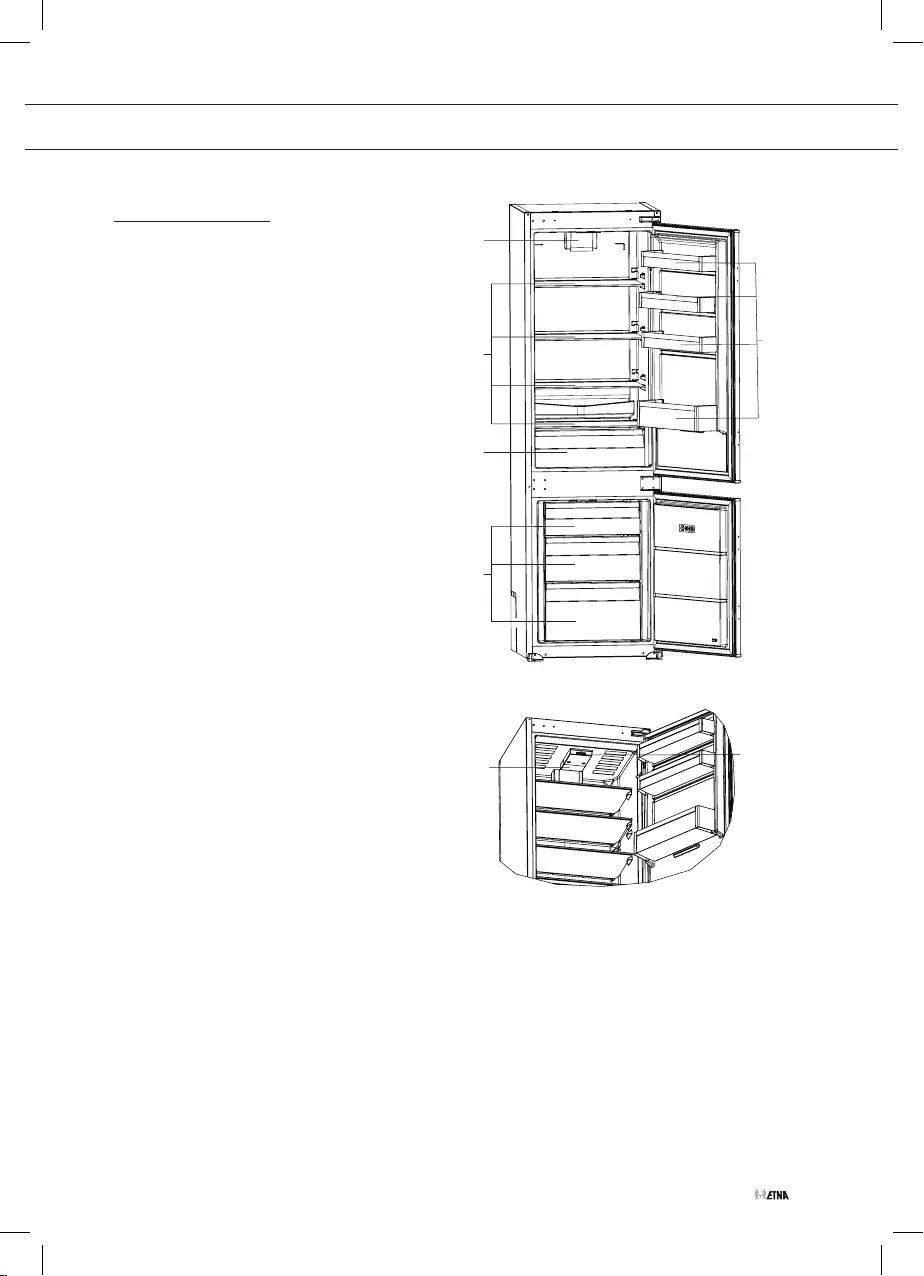
EN 15
Appliance
Refrigerator
1. Thermostat knob
2. LED lamp & cover
3. Fan
4. Shelves
5. Vegetable drawer
6. Door compartments
Freezer
7. Freezer drawers
DESCRIPTION OF THE APPLIANCE
1
2
10
11
6
4
5
7
3
1
2
10
11
6
4
5
7
3
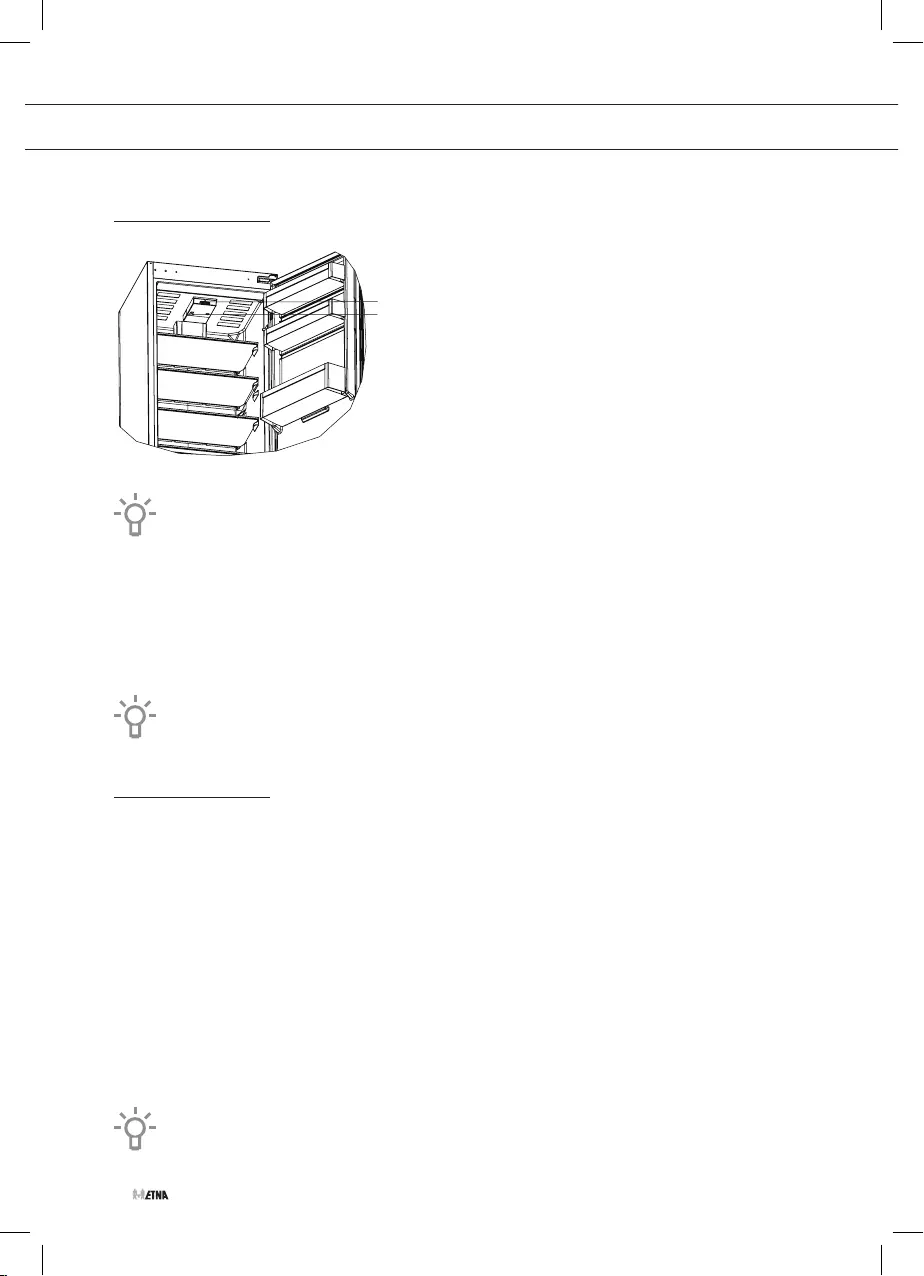
EN 16
Setting the thermostat
Thermostat knob
Intensive freezing switch
The thermostat automatically regulates the inside temperature of both compartments.
Thermostat Setting:
• The recommended temperature setting is setting 4.
• Set a higher temperature by turning the thermostat knob to setting 1, 2 or 3.
• Set a lower temperature by turning the thermostat knob to setting 5.
• Disconnect from the power mains; the appliance is off.
The recommended temperature of the refrigerator compartment is 4 °C and the
recommended temperature of the freezer compartment is -18 °C.
Fast freezing
Freezing with intensive freezing function (winter setting)
Activate the intensive freezing function eight hours before freezing fresh food and the freezer will
run continuously to provide maximum cooling. The freezing temperature drops and the appliance
switches to the lowest temperature. Place the food to be frozen in the freezer quickly. As soon
as the food is frozen you must switch off the intensive freezing button (after a maximum of 24
hours).
Performance at low ambient temperature
If the ambient temparature is less than 16 °C, the intensive freezing switch can be used to obtain
good performance at low ambient temperature. If the ambient temperature is above 16 °C, the
intensive freezing function must be switched off when you do not want to use this function.
Attention
Do not switch on the intensive freezing function unnecessarily. This will save energy.
OPERATING THE APPLIANCE
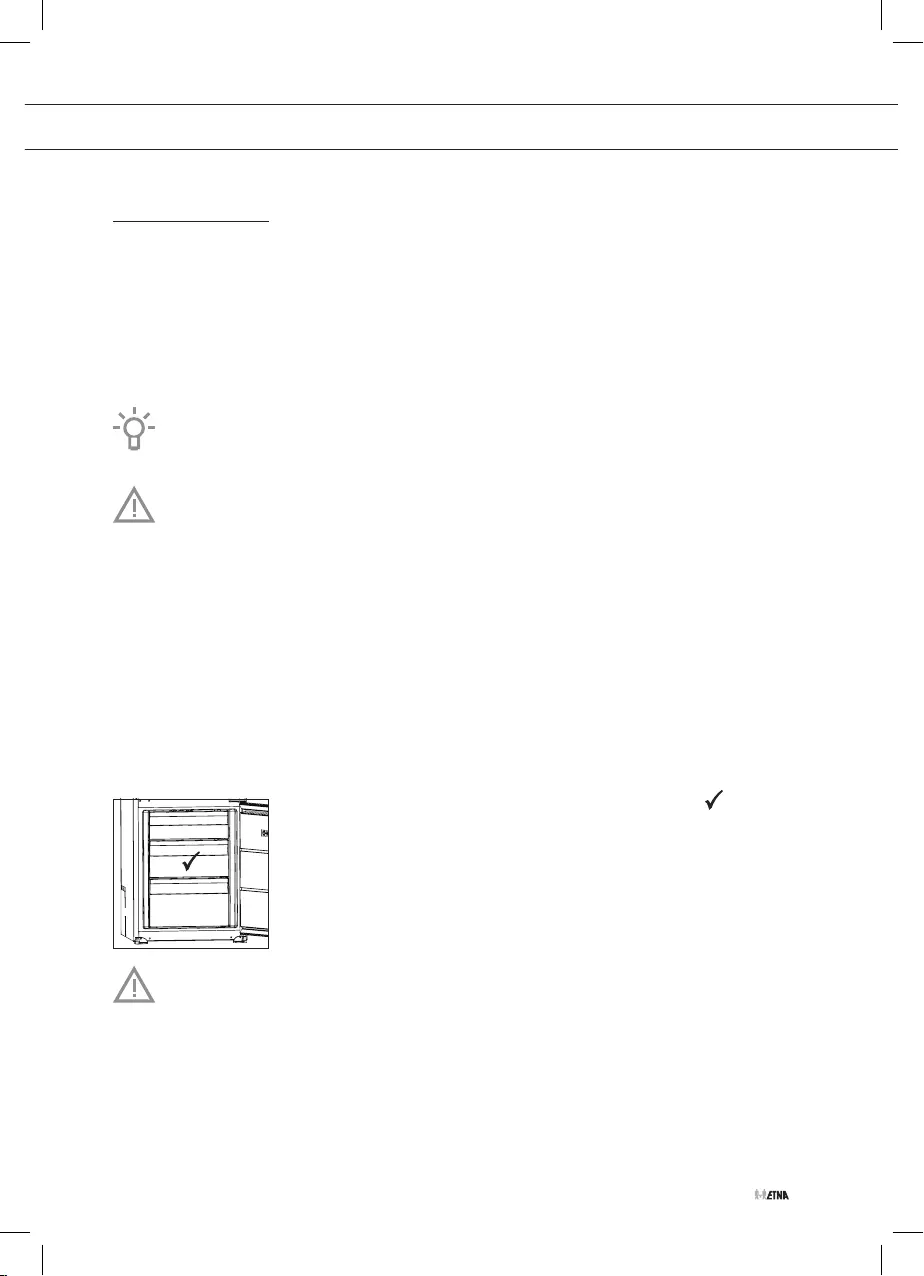
EN 17
STORING AND FREEZING FOOD
Recommended distribution
Sections of the refrigeration compartment
• Upper section: canned food, bread, wine and pastas, etc.
• Middle section: dairy products, ready-to-cook meals, desserts, soft drinks, beer and cooked
food, etc.
• Lower section: meat, meat products, delicatessen products.
• Vegetable drawer: vegetables and fresh fruit.
Store food that spoils rapidly at the back of a shelf or at the back of the drawer at the
lowest temperature.
Do not store fruit (bananas, pineapples, papaya, citrus fruits) and vegetables (courgettes,
tomatoes, aubergines, cucumber, sweet peppers and potatoes) that are sensitive to low
temperatures in the refrigerator.
Sections of the door
• Top/middle door compartment: eggs, butter, cheese and sauces, etc.
• Bottom door compartment: drinks, cans and bottles, etc.
Sections of the freezer compartment
• Top section: leftovers, ice, pizza.
• Middle section: meat, fish, bread.
• Bottom section: standard freezer, vegetables and fruit.
The best location for freezing fresh food is marked with a .
Do not store lettuce, eggs, apples, pears, grapes, peaches, yoghurt, buttermilk, sour
cream or mayonnaise in the freezer.

EN 18
Avoid contamination of food
To avoid contamination of food, please respect the following instructions:
• Opening the door for long periods can cause a significant increase of the temperature in the
compartments of the appliance.
• Regularly clean surfaces that can come in contact with food and accessible drainage
systems.
• Store raw meat and fish in suitable containers in the refrigerator, so that it is not in contact
with or drip onto other food.
• If the refrigerating appliance is left empty for long periods, switch off, defrost, clean, dry, and
leave the door open to prevent mould developing within the appliance.
Storing fresh food in the refrigerator
Important recommendations for storing fresh food
• To ensure the quality of fresh food, it is important that:
▷the food is well-packaged;
▷the appliance is at the correct temperature;
▷the appliance is clean.
• Take good note of the use-by date stated on the food packaging.
• Put food in the refrigerator in sealed containers or in suitable packaging. This will prevent
the food from picking up or spreading odours and will keep it dry.
• If droplets form on the glass shelf above the vegetable drawer, open the vent and dry off the
shelf. This will reduce the humidity.
• Do not store flammable, unstable or explosive materials in the refrigerator.
• Store bottles that have been opened upright and close them tightly.
• Some organic solutions, such as essential oils, in the skin of lemons and oranges, and
butyric acid, that come into long-term contact with plastics can eat into the material and
cause premature ageing.
• A disagreeable odour is an indication that the appliance is not clean or that it contains food
that has spoiled (see the chapter ‘Maintenance’).
• Take perishable foods out of the refrigerator when you will be away from home for a longer
time.
STORING AND FREEZING FOOD

EN 19
Freezing and storing foods in the freezer
Important recommendations for freezing fresh food
• The maximum quantity of food that you can put in the freezer in one go is stated on the type
plate. Putting more than this maximum quantity of food into the freezer will slow the freezing
process and reduce the quality. Moreover, this will also harm the quality of frozen food
already stored in the freezer.
• Use only good-quality fresh food that is suitable for freezing.
• Allow hot food to cool to room temperature.
• Food needs to be frozen quickly. It is recommended that you use small packs.
• Use air and watertight packaging to prevent the food from drying out and lose its vitamins.
• Note the type and quantity of the food on the packaging, together with the date on which it
was frozen.
• Do not allow fresh food to come into contact with frozen food.
• You can remove all the drawers to make use of the total volume of the freezer compartment.
Put the food directly on a shelf and on the base of the freezer.
Freezing small quantities of fresh food/making ice cubes
See the chapter ‘Recommended distribution’ for the best location for freezing fresh food
(1 to 2 kilograms) and making ice cubes.
Freezing large quantities of fresh food
• Activate the intensive freezing function 24 hours before you plan to freeze the food.
• Distribute the fresh food equally between all the drawers in the freezer compartment.
• After 24 hours, you can transfer the food to another compartment in the freezer and then
freeze a new batch of food.
Important recommendations for storing frozen food
• Follow the manufacturer’s instructions for the storage and use of frozen food. Take note of the
recommended storage temperature and use-by date stated on the packaging.
• Use only food in undamaged packaging that has been stored at a temperature of -18 °C or lower.
• Do not buy food covered in frost. This indicates that the food has thawed or partially thawed
several times and, as a result, is of inferior quality.
• Make sure that the food does not thaw during transport. An increase in its temperature will
shorten the storage life and harm the quality of the food.
STORING AND FREEZING FOOD
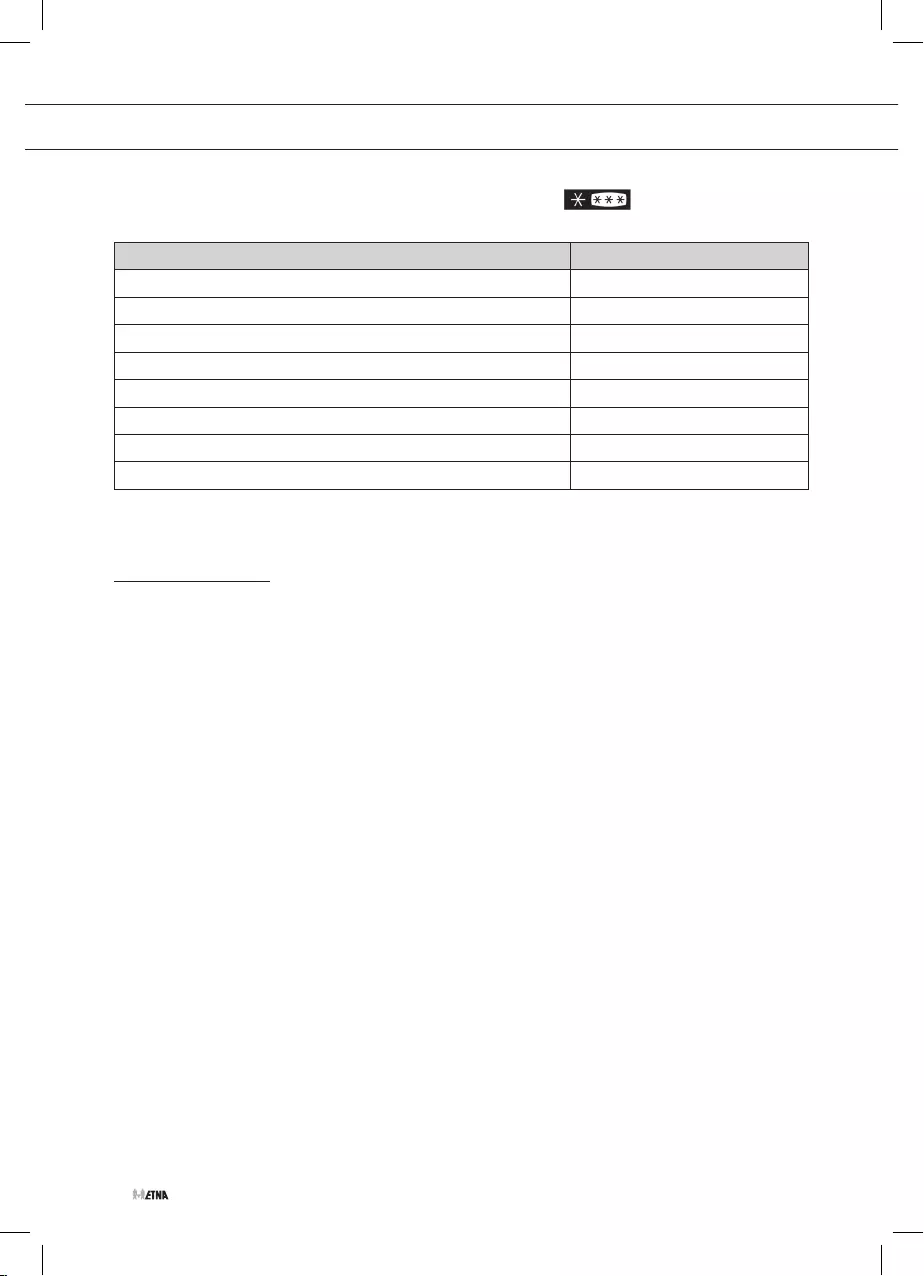
EN 20
Recommended storage times of frozen food in the freezer
Type of food Storage life
Fruit, beef 10 to 12 months
Vegetables, veal, poultry 8 to 10 months
Venison 6 to 8 months
Pork 4 to 6 months
Finely chopped or minced meat 4 months
Bread, pastas, cooked dishes, whitefish 3 months
Offal 2 months
Smoked sausage, bluefish 1 month
Thawing frozen food
• Thawing is an important step in storing food preserved by freezing. Food must be thawed in
the correct way.
• Suitable methods of thawing food are:
▷in the refrigerator;
▷in cold water;
▷in a microwave or conventional oven with a suitable thaw program.
• Some frozen products can be prepared without needing to thaw them first. The manufacturer
will state this on the packaging.
• The food needs to be packed in small portions. In this way the food thaws faster.
• Use partially or completely thawed food as quickly as possible. The bacteria in thawed food
are reactivated and the food will spoil rapidly. This applies in particular to fruit, vegetables
and ready-made food.
• Do not refreeze partially or completely thawed food.
STORING AND FREEZING FOOD
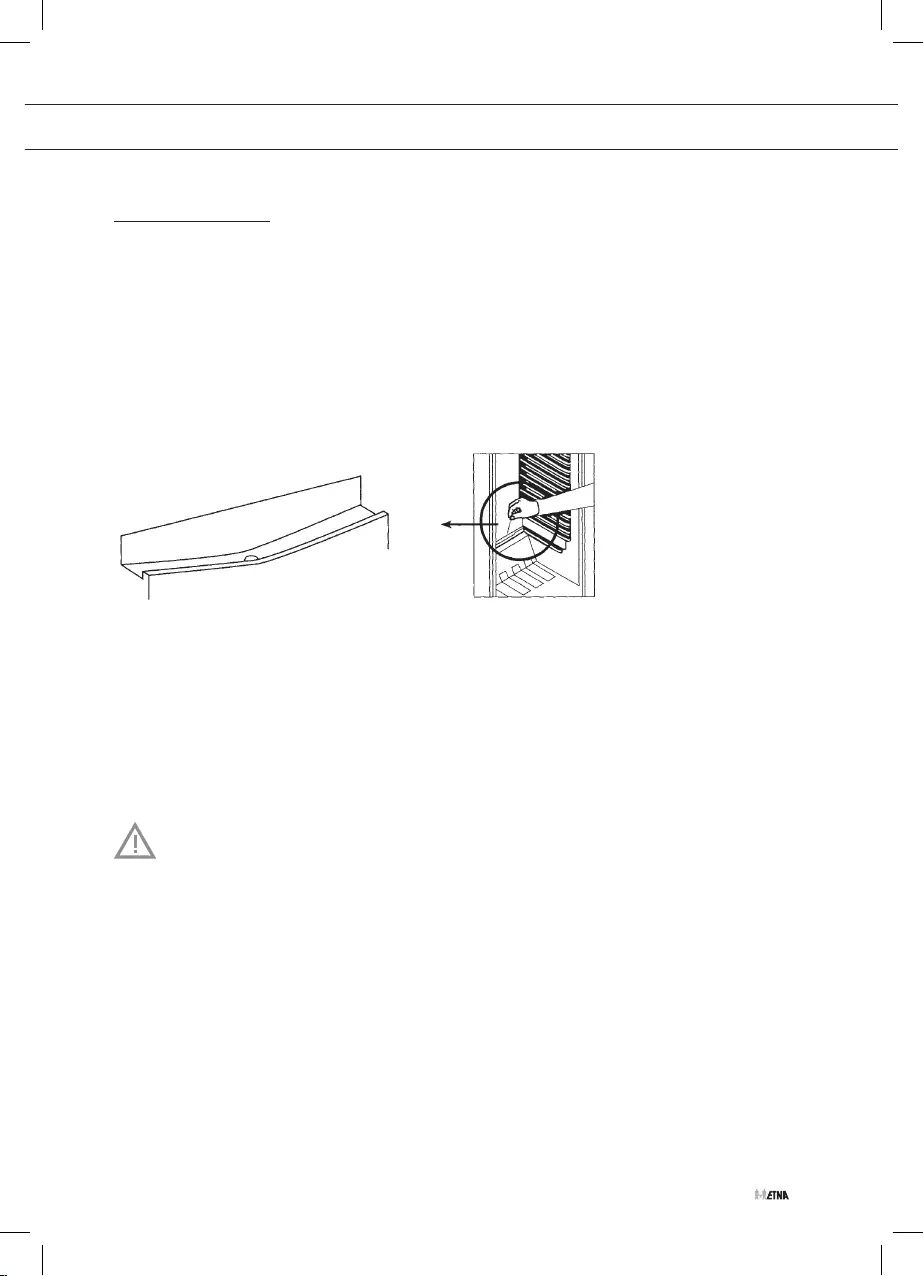
EN 21
MAINTENANCE
Defrosting the appliance
Automatic defrost of the refrigeration compartment
The refrigeration compartment defrosts automatically from time to time. The presence of water
drops on the back wall at the inside of the refrigerator indicates that the appliance is busy
defrosting automatically. The defrost water runs through the drainage spout to a receptacle
where it evaporates.
Ensure that the drain outlet is clean. You can clean a clogged drain with asatay stick, for
example.
Defrosting of the NoFrost freezer
The NoFrost freezer defrosts automatically. Any frost deposits will then disappear.
Any ice or frost deposits that nevertheless form in the freezer compartment can be caused by
unusual use of the appliance (opening the door too often and too long or poorly sealing door,
etc.). The freezer will then need to be defrosted manually.
Switch off the appliance in the event of extreme ice formation. Remove the food in the
freezer and protect it so that it cannot partially or completely thaw. Clean and dry the
interior of the freezer. Switch on the appliance and adjust the temperature to the required
setting before you put the food back into the freezer.

EN 22
MAINTENANCE
Cleaning the appliance
Switch off the appliance and remove the plug from the socket before you start cleaning it.
Do not use abrasive cleaning agents, as they can damage the surface.
Activate the intensive freezing function 24 hours before you plan to clean the freezer.
• Before cleaning, frozen foods should be wrapped in several layers of paper and kept in a
cool place. The inevitable rise in temperature will shorten their storage life. Remember to
use these foods within a relatively short period of time.
• Regularly clean the interior of the appliance with lukewarm water. If so required, add a
neutral cleaning agent or special refrigerator cleaner to the water. Clean all surfaces with
a soft cloth. Wipe the cleaned parts with a cloth with clean water and then dry them
thoroughly.
• Do not put parts of the appliance in a dishwasher: this could damage them.
• Dry the inside of the unit, plug in the mains, and set the thermostat knob to the lowest
temperature setting. After 24 hours, set the thermostat to the normal position.
When you are not going to use the appliance for a longer period then switch it off with the
appropriate key and disconnect it from the mains. Empty, defrost and clean the appliance,
and leave the door ajar.
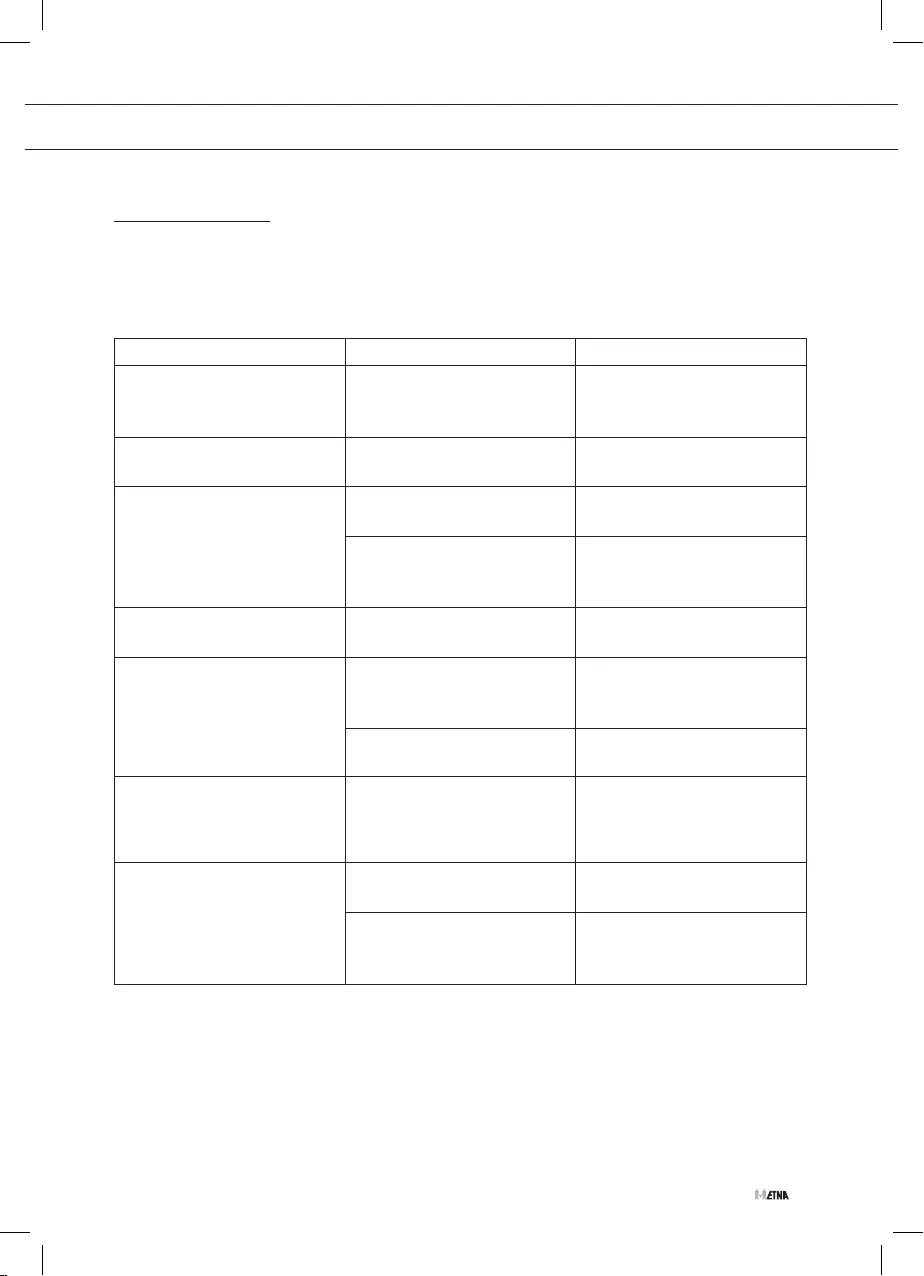
EN 23
FAULTS
Faults table
When you have any doubts about whether your appliance is working properly you should not
immediately assume that it is defective. We recommend that you should in any case check the
points in the following table.
Symptom Possible cause Solution
The refrigerator emits a slight
odour when used for the first
time.
New appliance. This is normal and disappears
when the appliance starts
cooling.
The appliance does nothing;
the lighting is not lit.
Plug not in socket. Insert the plug in the socket.
Temperature inside
refrigerator too high or too
low.
Thermostat setting incorrect. Adjust the thermostat
properly.
The door seals are dirty or the
seals are damaged.
Clean the door seals. Call
the service centre if the door
seals are damaged.
Water runs from the
refrigerator.
Defrost water drain clogged. Clean defrost water drain (see
"Defrost").
Appliance makes a noise. Incorrect positioning of food
in the refrigerator (or freezer).
Place foods in the proper
manner in the refrigerator or
freezer.
There is an object against the
appliance.
Remove the object.
The LED lighting does not
work.
LED lamp faulty. Call an authorized service
technician. Do not attempt
to replace the LED lighting
yourself.
Ice building up. Freezer compartment door not
closed properly.
Make sure that the door is
closed properly.
The door seals are dirty or the
seals are damaged.
Clean the door seals. Call the
service centre if the door seals
are damaged.

EN 24
FAULTS
Note
It is normal for the cooling circuit to make gurgling or expansion noises.
If you are unable to solve the problem then contact the service centre. When you do so, state the
type, model and serial number shown on the type plate or label on the inside of the appliance.
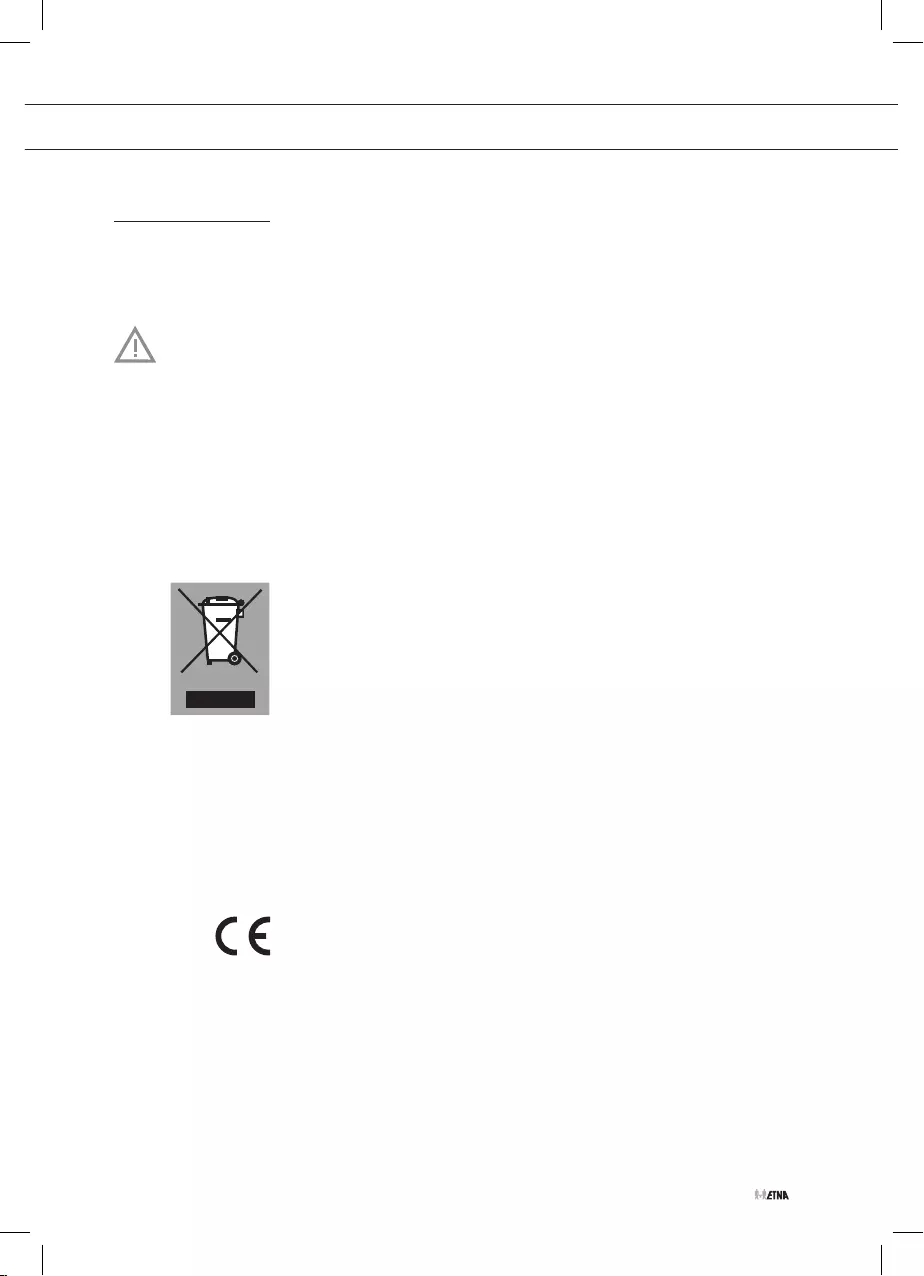
EN 25
ENVIRONMENTAL ASPECTS
Disposal of packaging and appliance
This appliance is made from sustainable materials. This appliance must be disposed of in a
responsible manner at the end of its service life. Contact the local authorities for information
about the method.
See also the chapter ‘Disposal’ in the Safety instructions.
The packaging of the appliance is recyclable. The following materials may have been used:
• Cardboard.
• Polyethylene foil (PE).
• CFC-free polystyrene (hard PS foam).
These materials must be disposed of in a responsible manner and in accordance with
government regulations.
The appliance is marked with a crossed out wheeled bin symbol to
draw your attention to the requirement for the separate disposal of
domestic electrical appliances. This means that the appliance may
not be disposed of in unsorted household waste at the end of its
service life. The appliance must be taken to a special municipal waste
processing location for separated waste or to a dealer who provides
this service.
Collecting and disposing of domestic appliances separately avoids
detrimental consequences for humans and the environment. This
ensures that the materials used to make the appliance can be
recovered and that substantial savings in the use of energy and raw
materials can be achieved.
Declaration of conformity
We hereby declare that our products conform to the applicable
European Directives, Regulations and requirements, as well as all
requirements in the standards to which reference is made.

EN 26

EN 27

829109 / VER 2 / 18-11-2020
829107
*829107*
De gebruiksaanwijzing is ook te vinden op onze website:
The instructions for use can also be found on our website:
www.etna.nl
www.etna.be